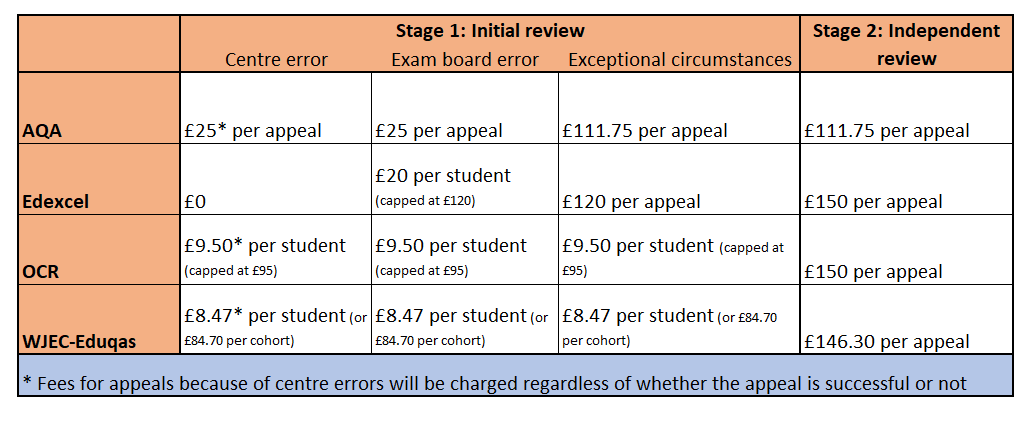Fees for unsuccessful appeals against GCSE and A-level grades will not be waived this summer, exam boards have confirmed.
With schools braced for a huge spike in demand for appeals from students grappling with the new system of standardised centre-assessment grades, leaders had called for appeal fees to be waived to create a “level playing field”.
It should not be the case that schools have to take a financial hit in order to facilitate this important avenue of redress
But AQA, OCR, Edexcel and WJEC-Eduqas have now all confirmed fees will apply for unsuccessful appeals, with two, AQA and Edexcel, preparing to levy higher charges if schools fail to prove there were “exceptional circumstances”.
Geoff Barton, general secretary of the ASCL school leadership union, said it was “disappointing that exam boards intend to press ahead with charging fees for appeals despite the difficult circumstances around this year’s results”.
He said schools had “never before had a situation in which grades are pulled down by a statistical model in this way, and it is likely that many students and teachers will feel this process has been deeply unfair”.
“The ability to appeal is one way of at least partially addressing this situation, and it should not be the case that schools have to take a financial hit in order to facilitate this important avenue of redress. We understand that there are costs associated with dealing with appeals, but surely the exam boards and government could have worked together to find a more equitable solution.”
As in a normal year, schools will not be charged if their appeal is successful on most grounds. However, three of the four boards will charge for all appeals made on the basis of a mistake on the part of a school, even if the appeal is successful.
However, the boards are yet to say how much they will charge for unsuccessful appeals based on pupils’ mock exam results, following the government’s last-minute announcement last night that they could be used in certain circumstances.
This year’s appeals system will work in two stages, with an “initial review” first, and then an “independent review” for any cases that can’t be resolved at the first stage.
AQA, the largest provider of GCSEs and A-levels in England, has confirmed that it will charge schools £25 for each appeal that is unsuccessful at the “initial review” stage.
However, the charge will rise to £111.75 if the appeal was made on the grounds that there were “exceptional circumstances” – for example where schools claim that grades should have been higher this year.
Appeals that fail at the second stage – the independent review – will also be charged at £111.75. Fees will also apply for appeals that are the result of schools’ own mistakes, regardless of whether they are successful or not.
In a statement on its website, AQA said: “We’ve always said we have no wish to gain financially from this summer’s special arrangements – so we’re already refunding 26 per cent of exam entry fees, which can be used for any appeal costs.”
OCR will charge £9.50 per student for each unsuccessful initial review, no matter the grounds, and the amount payable will be capped at £95 “regardless of the number of students involved”.
Schools will then have to pay £150 for every independent review that is not upheld. Again, appeals on the basis of mistakes made by schools will incur a fee no matter what.
OCR said its initial reviews would be “conducted by a specialist team within OCR”, and that independent reviews would be “conducted by a team with relevant knowledge independent of OCR”.
“We’ll only invoice schools and colleges after the outcome of an appeal is confirmed and after schools and colleges have received our rebate from their entry fees.”
Edexcel will not charge schools for initial reviews on the grounds of centre errors, but will charge £20 per student for unsuccessful initial reviews on the grounds that the exam board made an error, up to a cap of £120 per student subject. It will charge £120 for failed initial reviews based on “exceptional circumstances”. Appeals that fail at the second independent review stage will be charged at £150.
Edexcel also acknowledged that schools would “want to know more” about the use of mock grades, adding: “We are working with Ofqual and the Department for Education, and will make further information available on our website – including on fees – as soon as we have more details to share.”
Eduqas, part of Welsh exam board WJEC, will charge £8.47 for unsuccessful initial reviews on behalf of an individual candidate, or £84.70 for an entire cohort. A full independent review will cost £146.30 if the appeal is not upheld, and like AQA and OCR, Eduqas will automatically charge for appeals based on schools’ errors.
Last year, fees for appeals ranged from between £111.75 and £148.30 for a preliminary appeal, and between £150 and £211.80 for a subsequent appeal hearing, meaning a school could pay as much as £360.10 per appeal.









Did exam boards charge regular fees for entries this year? If so, what was the justification for this, as workload for them was lower given the absence of administration on their end, no?